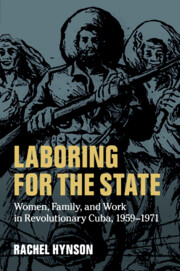Book contents
- Laboring for the State
- Cambridge Latin American Studies
- Laboring for the State
- Copyright page
- Dedication
- Contents
- Figures
- Acknowledgments
- Abbreviations
- Introduction
- 1 In the Hands of Physicians
- 2 “The husband must protect the wife and the latter obey the husband”
- 3 From the Streets to the Home
- 4 The Elasticity of Truth
- Epilogue
- Bibliography
- Index
- Series page
2 - “The husband must protect the wife and the latter obey the husband”
Operation Family, Wedding Palaces, and Nuclear Families
Published online by Cambridge University Press: 09 January 2020
- Laboring for the State
- Cambridge Latin American Studies
- Laboring for the State
- Copyright page
- Dedication
- Contents
- Figures
- Acknowledgments
- Abbreviations
- Introduction
- 1 In the Hands of Physicians
- 2 “The husband must protect the wife and the latter obey the husband”
- 3 From the Streets to the Home
- 4 The Elasticity of Truth
- Epilogue
- Bibliography
- Index
- Series page
Summary
Chapter 2 contends that the seemingly innocent attempt to document citizens through Operation Family (1959–1965) developed into an instrument for consolidating state power. This Ministry of Justice campaign to legalize extra-legal unions and register undocumented Cubans provoked a surge in marriage, a direct consequence – this chapter demonstrates – of fixed-term laws that concurrently restricted the power of the judiciary. The chapter also argues that Cuban leadership advanced legal matrimony in order to supplant female heads of household, whose participation in the paid-labor force could support men engaged in illegal or counterrevolutionary activities. Las Villas and Matanzas, provinces where counterrevolutionaries most threatened revolutionary government authority, had the highest rates of legal marriage during the peak years of the marriage campaign. These two provinces were also predominantly white, suggesting that MINJUS prioritized the regulation and reformation of rural, Hispanic white couples over those of Afro-Cubans. The second half of the chapter examines the inauguration of Wedding Palaces and material benefits meant to incentivize marriage. Popular discourse suggested that Cubans were marrying (and divorcing) in high numbers in order to take advantage of the increased purchasing power allocated to newlyweds. In these ways, couples showed themselves reluctant to acquiesce to the state’s marital expectations.
Keywords
- Type
- Chapter
- Information
- Laboring for the StateWomen, Family, and Work in Revolutionary Cuba, 1959–1971, pp. 91 - 148Publisher: Cambridge University PressPrint publication year: 2020

